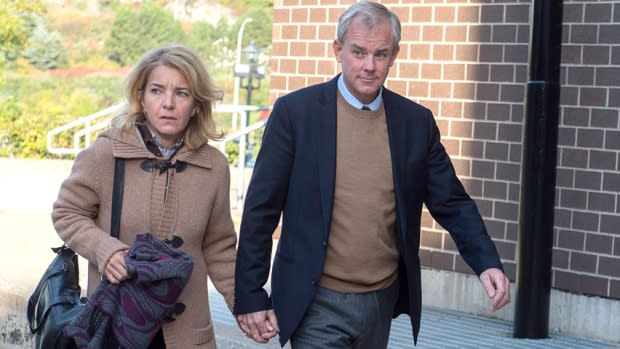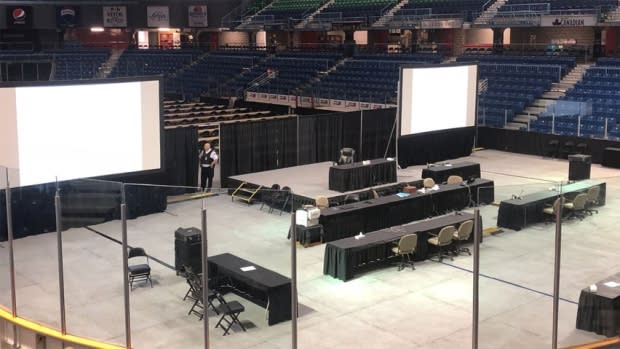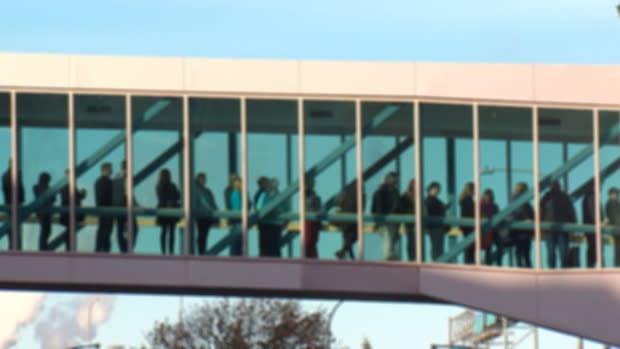Dennis Oland pleads not guilty, again, in father's death
Dennis Oland has again pleaded not guilty to second-degree murder in the 2011 bludgeoning death of his father multimillionaire Richard Oland.
Oland, 50, entered the plea Monday afternoon at Harbour Station, Saint John's largest arena, which served as a makeshift courtroom for the fist phase of jury selection for his retrial.
He leaned forward into the microphone, facing the judge, and said, "I plead not guilty," as 1,009 potential jurors, his wife, Lisa Oland, and mother, Connie Oland, quietly looked on from the stadium seating behind him.
It marks the next chapter of one of the most sensational murder cases in New Brunswick history.
Oland was convicted in December 2015 of second-degree murder, but the New Brunswick Court of Appeal overturned the decision in October 2016 and ordered a new trial, citing an error in the trial judge's instructions to the jury.
Prospective jurors were summonsed to appear at 9 a.m. AT and the last of them weren't dismissed until around 8:30 p.m.
The formal proceedings didn't get underway until mid-afternoon, after everyone got through security, registered and were served a free lunch of submarine sandwiches.
Oland, sporting a navy blazer and grey pants, was led by one of his defence lawyers to a table on the covered ice surface and took a seat. He slowly spun his chair around and glanced at the crowd, some of whom will soon determine his fate.

Court of Queen's Bench Justice Terrence Morrison said 14 jurors and two alternates will ultimately be selected for the new trial. Normally, juries only have 12 members, but because the trial is expected to be lengthy — approximately 16 weeks, sitting primarily Tuesdays through Fridays, 9:30 a.m. until 4:30 p.m. — there is an increased chance of someone getting sick or being unable to serve for other reason.
The actual jury selection process won't begin until Oct. 29 at the Saint John Law Courts building. The two-week delay is required for "legal reasons," the judge said, without elaborating.
During the multi-step selection process, individuals will have an opportunity to ask to be excused, face questions by the judge, be deemed acceptable or not by two so-called triers chosen from the jury pool to assist in the selection process and, finally, scrutiny from the Crown and defence, who can either accept or reject them.
Monday's proceedings were simply to divide the prospective jurors into groups of 50 and to give them a tentative date and time to appear at the courthouse, which wasn't big enough to accommodate the anticipated large crowd.
There is a publication ban on the total number of people summonsed to attend Monday, but the judge announced 1,009 had registered.

It's unclear how many others were previously excused by the head sheriff for reasons laid out in the provincial Jury Act, or were no-shows, who could subsequently be found in contempt of court and fined up to $1,000.
A total of 5,000 were served a summons for Oland's first trial in 2015 — nearly 17 times the usual number in New Brunswick.
It was one of the largest jury pools in the province and larger than some of the most high-profile cases across Canada that have generated international headlines, including Robert Pickton, Luka Magnotta and Paul Bernardo.
Justice officials wanted to ensure they had a large enough jury pool from which to select 12 jurors, two alternates and two additional jurors without bias.
They were concerned about the amount of pretrial publicity and possible conflicts of interest, given the city's small population of about 68,000 and the Oland family's prominence as founders of Moosehead Breweries Ltd., the oldest independently owned brewery in Canada.

The arena was used for the initial jury selection in the first trial as well.
On Monday, each prospective juror was assigned a number when they registered, which was placed in a wooden box. Court clerk Amanda Evans then drew the numbers at random and read them aloud over the public address system.
The process continued until 6 p.m. when there was a short break for a free pizza dinner, and continued into the evening, with the first group of 50, Group A, instructed to attend the courthouse on Oct. 29, and that last group of 50, Group T, on Nov. 9.
Patience quickly started to wear thin for some, as they muttered to one another about cancelled plans, the hard seats and cold arena.
"I understand there are a few of you who are already frustrated by the process," the judge said, urging them to be patient.
"This is very serious business" and the law is "methodical in its approach," he said. "I must make sure it's followed to the letter."

As of 10:30 a.m., a long line of people still stretched the length of the arena and well out the door.
"Please be aware you may be here until late in the day — please make necessary arrangements before noon," a handout advised. That could include calling employers or child-care providers, or having prescription medications delivered, an official explained.
They were allowed to use electronic devices in silent mode while they waited, but could not take any photos or videos. Once the judge entered, court was in session and they weren't able to use electronic devices or leave, until instructed to do so by the judge.
"While every effort is being made to expedite the process, the ending time is uncertain," the handout said.
Oland, a financial adviser, is accused of killing his 69-year-old father, whose body was discovered in his Saint John office on July 7, 2011.
He has been living in the community under conditions since October 2016, when the Court of Appeal released him on bail.
Oland has maintained his innocence from the beginning and his extended family has stood by him.

